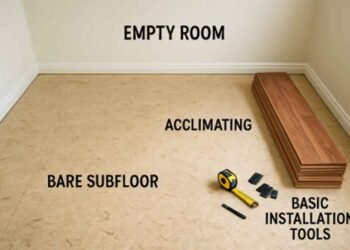Life in Dallas is a unique mix of opportunity and affordability. With a thriving job market and a reasonable cost of living, many people find it hard to leave the city once they’ve settled in. However, sometimes, upgrading your lifestyle—whether for better schools, a shorter commute, or a more upscale neighborhood—requires making a local move.
While moving is inherently stressful, it can feel almost impossible when you’re juggling a full-time job. Busy professionals often find themselves overwhelmed with the planning, coordination, and physical labor involved. But it doesn’t have to be that way.
With the right strategies, like those discussed in this article, you can make your move efficient and relatively stress-free.
1. Let Movers Handle the Heavy Lifting
One of the best decisions you can make is to hire professional movers. They’ll take care of the physical labor, allowing you to focus on your job and other responsibilities. For those in Dallas, local movers offer an added advantage: they’re familiar with the area’s notorious traffic patterns and can navigate efficiently.
When choosing movers, consider a few key factors. Check online reviews and ask for recommendations from friends or colleagues. Always request quotes from multiple companies to compare pricing and services. To protect your belongings, ensure you hire a reliable Dallas local moving company that is licensed and insured. By delegating this crucial aspect of your move, you’ll save time and energy while ensuring your items are handled professionally.
2. Create a Realistic Moving Timeline
Planning ahead is the foundation of a stress-free move. Create a realistic timeline that breaks down all moving tasks into manageable steps. Start as early as possible, ideally six to eight weeks before your moving date.
Begin by setting deadlines for key tasks, such as scheduling movers, notifying your landlord (if renting), and updating your address with banks and subscriptions. Avoid cramming everything into the final days; instead, spread tasks out to maintain a sense of control. Remember to account for unexpected delays and leave some buffer time.
3. Master the Art of Organized Packing
Packing efficiently can make a world of difference when moving day arrives. Invest in quality packing supplies, including sturdy boxes, lots of bubble wrap for fragile items, and packing tape. Skimping on materials can lead to damaged items or unnecessary stress during the move.
Label each box clearly with whatever is inside, including the room to which it belongs. This will make unpacking easier and faster. Pack strategically by grouping similar items together and keeping essentials like toiletries and work supplies in a separate, easily accessible bag. Remember, a little extra effort during packing will save you from headaches later.
4. Leverage Technology for Efficiency
Modern technology offers plenty of tools to make moving more manageable. Use apps to create an inventory of your belongings and keep track of tasks. Digital checklists help you stay organized and ensure nothing gets overlooked.
You can also schedule reminders for tasks like transferring utilities and forwarding your mail. Consider storing important documents, such as lease agreements and moving contracts, in a cloud-based system for easy access. Technology can streamline your move and keep you on top of every detail, even with a busy schedule.
5. Delegate and Seek Help When Needed
Moving doesn’t have to be a solo effort. Reach out to family, friends, or even colleagues to lend a hand with specific tasks. Whether it’s packing, babysitting, or assembling furniture in your new home, having help can make the process faster and more enjoyable.
If your schedule doesn’t allow for much hands-on involvement, consider hiring additional services. Cleaning companies can prepare your old home for its next occupants, while setup professionals can assist with organizing your new space. Delegating tasks ensures everything gets done without overwhelming yourself.
6. Plan for Your Work Schedule
Balancing a full-time job with moving can be tricky, but careful planning can help. If possible, take a few days off around your moving date to focus entirely on the transition. Alternatively, discuss flexible work arrangements with your employer, such as remote work or adjusted hours.
Schedule moving tasks around your work commitments and prioritize efficiently. Use your lunch breaks or weekends to handle smaller tasks, like updating your address or packing non-essential items. Staying organized ensures that neither your job nor your move suffers.
7. Address Emotional and Physical Well-Being
Moving can be an emotionally and physically exhausting experience. Acknowledge the mixed feelings that come with leaving your current home and starting fresh. Take time to process these emotions and focus on the exciting opportunities ahead.
To avoid burnout, maintain a routine that includes adequate sleep, proper meals, and physical activity. Staying hydrated and taking breaks during the moving process can also help. Remember, taking care of yourself is just as important as taking care of the move.
8. Prepare Your New Home Before Moving In
Before moving in, make sure your new home is ready. Clean thoroughly, even if the previous occupants left it in good condition. This is also the time to handle repairs or improvements, such as painting walls or fixing minor damages.
Ensure utilities, like electricity, water, and internet, are set up and functioning before your arrival. Update your address with important institutions, such as banks, employers, and subscription services. Preparing your home ahead of time allows for a smoother transition.
9. Unpack Strategically
Unpacking can be overwhelming, but a strategic approach makes it manageable. Start with the essentials: your bedroom, kitchen, and bathroom. Having these areas functional will make your first days in the new home more comfortable.
Tackle one room at a time to stay organized. Avoid opening all boxes at once, as this can lead to unnecessary clutter. Stay calm, don’t panic, and take breaks as needed. You deserve some rest, so relax and just enjoy your new home.
Moving doesn’t have to be a nightmare, even for busy professionals. By following these strategies, you can make the process smoother and less stressful. The key is to approach each step methodically and stay organized. Remember, a well-executed move isn’t just about changing locations—it’s about upgrading your life with minimal disruption. With these tips in mind, you’re well on your way to a successful and stress-free move.












